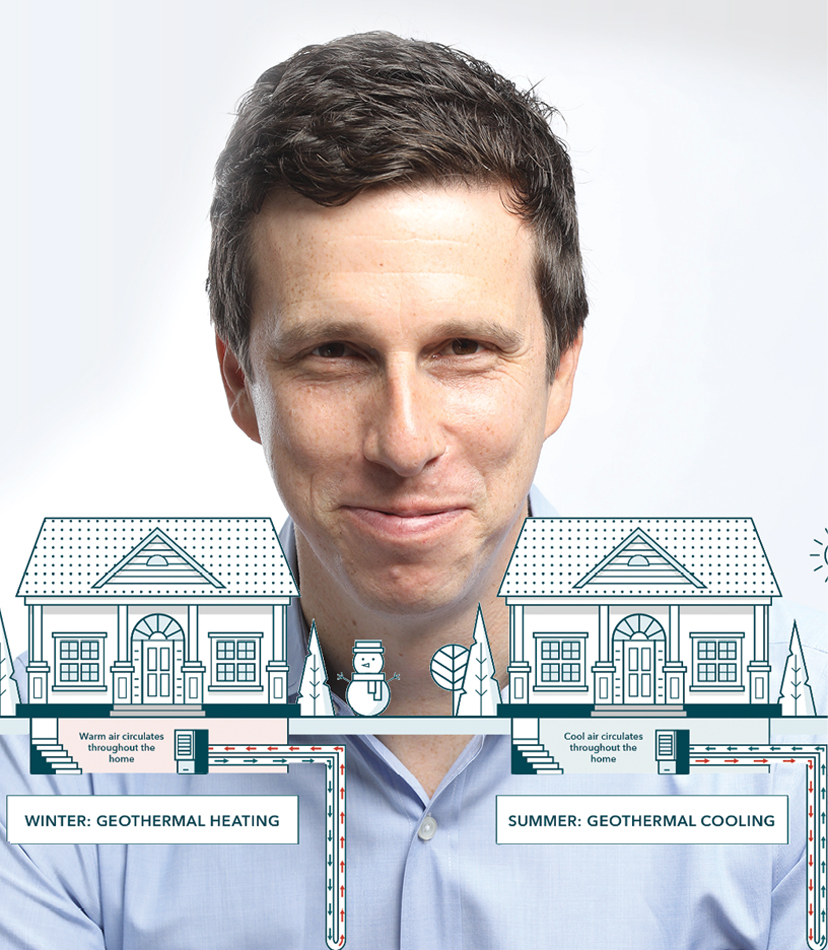Dandelion Energy is blooming. The company that specializes in geothermal heat pump systems has a new 31,000-square-foot headquarters and warehouse at 333 N. Bedford Road in Mount Kisco.
And it just obtained $30 million from investors, including a fund led by Bill Gates, bringing the company”™s total funding to $65 million.
And the company, which has more than 100 employees, is in a hiring mode.
“We used to have a corporate headquarters in Manhattan but we don”™t do any geothermal installations in Manhattan,” Dandelion Energy”™s CEO Michael Sachse told the Business Journal. “We do it in Westchester, going up to Albany, going east into Connecticut.

“We really felt like the heart of our business is in Westchester so when we decided to expand our warehouse we decided to also put our corporate headquarters into Mount Kisco as well.”
Breakthrough Energy Ventures (BEV), the investment fund led by Bill Gates, has already given out $1 billion to high-tech startups and recently raised another $1 billion to invest in scientific breakthroughs that have the potential to deliver cheap and reliable clean energy to the world.
Among the other investors in BEV are former New York City mayor and presidential candidate Michael Bloomberg, Jeff Bezos of Amazon and Ben Walton whose grandfather, Sam Walton, founded Walmart.
“We have a higher tolerance for technical risk, because we know it”™s tough to determine which technologies will succeed in a complicated energy market. We are led by our investors, who are a unique group of global business leaders, entrepreneurs, energy experts, and company builders who can help new companies navigate the challenges of building a business while developing partnerships with the companies and institutional investors who will help bring those products to scale,” Gates said.
“The fund is also driven by science. Because of the technical nature of succeeding in an energy market, we will build a team that knows as much about the science behind energy breakthroughs as the investment strategies necessary to build those businesses. Finally, the fund is committed to discovering breakthroughs, wherever they are.”
Geothermal heat pumps draw heat from the earth to warm buildings in the winter and in the summer provide cooling by taking heat from buildings and transferring it underground. They use liquid in a loop of piping that runs between a temperature exchange unit inside and the ground to bring heat in or send it out.
More common air-source pumps draw heat from outside air that passes through the unit. For air conditioning, they expel heat into the air. Underground, below the frost line, the earth remains at a fairly constant 50 degrees Fahrenheit regardless of the air temperature, allowing a geothermal heat pump to be more efficient that an air-source pump. Geothermal units don”™t need to struggle to pull heat from frigid air in the winter and force excess heat into very hot air during the summer.
Dandelion Energy got started at the research and development lab of Google”™s parent company Alphabet Inc. It was spun off as an independent company in 2017.
Sachse said that the company uses contractors as well as its own staff for installations. In addition to placing the heat pump itself inside of a building, often in the same place where the old furnace had been in a house”™s basement, the company drills as if digging a small-diameter well 370 feet down into the earth to install heat exchange piping in a vertical configuration. This avoids digging up a backyard in order to place the pipe loop horizontally.
“When you look at home heating, the vast majority of it is done by burning fossil fuel. What we”™ve attempted to do is to bring as much technology as we can to bear on the problem and make it more affordable for households,” Sachse said. “ We want someone who”™s cost-conscious, and we assume that most people are, to see a good return on switching to geothermal.”


While noting that each installation is different, Dandelion Energy says that costs for a system can begin in the $18,000 to $25,000 range after incentives provided by state and federal governments and utilities. Sachse said that by financing the cost it”™s possible to see immediate savings over the monthly costs of older heating and cooling systems.
When the entire installation is paid up front, it typically takes five to seven years to break even and cash savings to begin.
“For a home switching from oil or propane, if they”™re paying cash they”™re going to see a five- to seven-year payback and then after that their heating bill will be 20% of what it used to be, their air conditioning bill will be 70% of what it used to be,” Sachse said.
“If they”™re financing it, which is a reasonable thing to do, then you”™re going to see a lower monthly energy expenditure from day one. The cost effectiveness as compared with natural gas is not as good at present because natural gas is awfully cheap. The thing that is happening though is that increasingly there are fewer and fewer gas connection options because in the background natural gas is a big carbon emitter and utilities and regulators are moving away from it. We think natural gas prices are going to go up and we are hopeful that geothermal is going to get more and more efficient.”
Sachse said that customers typically are looking first and foremost for cost savings.
“We see a lot of customers who are sort of technology enthusiasts and like having something different and more sophisticated in their home,” Sachse said.
“We don”™t see many people who buy specifically because of climate concerns but we do think that it”™s definitely a plus factor as it should be.”
Sachse said Dandelion Energy only started operating in western Connecticut in September of last year and already about 25% of its business is coming from the area. Another 25% is coming from the Albany region and the remaining 50% from Westchester and the Hudson Valley.
“We do intend to expand to Long Island and to Massachusetts, hopefully as well to upstate New York,” Sachse said. “It”™s certainly my hope that over time we”™re continually improving the product and the ability to deliver effectively. We partner with a lot of the local utilities and they”™re very supportive of the technology.”
















